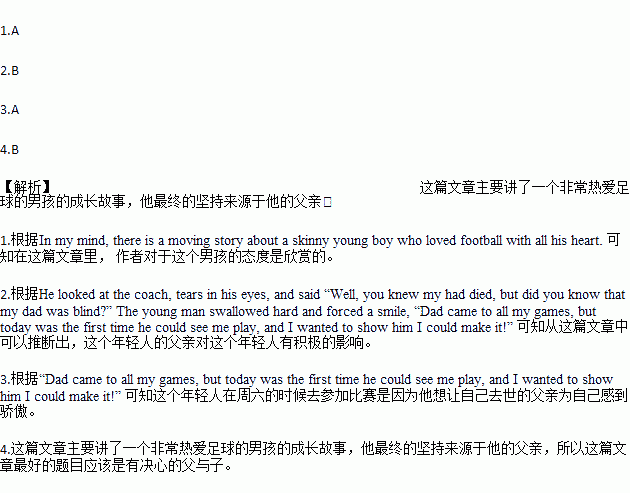题目内容
In my mind, there is a moving story about a skinny young boy who loved football with all his heart.
Practice after practice, he eagerly gave everything he had. Being half the size of the other boys, he got absolutely nowhere. Despite his hard training at all the games, this hopeful athlete sat on the bench and hardly ever played.
This teenager lived alone with his father, and the relationship between the two of them was very special. Even though the son was always on the bench, his father was always in the stands cheering. He never missed a game. This young man was still the smallest of the class when he entered high school. But his father continued to encourage him.
The young man loved football and was determined to try his best at every practice, and perhaps he’d get to play when he became a senior. All through high school he never missed a practice nor a game but remained a benchwarmer. Besides, his faithful father was always in the stands, always with words of encouragement for him. When the young man went to college, he decided to try out for the football team as a “walk—on”. Everyone firmly believed that he could never make the cut, but he did.
The news that he had survived the cut thrilled him so much that he rushed to the nearest phone and called his father. His father shared his excitement and was sent season tickets for all the college games. This persistent young athlete never missed practice during his four years at college, but actually he never got the real chance to play in a game.
It was at the end of his senior football season that the coach met him with a telegram. The young man read the telegram and he became totally silent. Swallowing hard, he mumbled to the coach, “My father died this morning. Is it all right if I miss practice today?” The coach put his arm gently around his should and said, “Take the rest of the week off, son. And don’t even plan to come back to the game on Saturday.”
Saturday arrived, and the game was not going well. In the third quarter, when the team was ten points behind, a silent young man quietly slipped into the empty locker room and put on his football gear. As he ran onto the sidelines (边线), the coach and his players were surprised to see their faithful teammate back so soon. “Coach, please let me play. I’ve just got to play today,” said the young man.
The coach pretended not to hear him. There was no way he wanted his worst player in this close play—off game. But the young man insisted, and finally feeling sorry for the kid, the coach gave in. “All right,” he said. “You can go in.’’ Before long, the coach, the players and everyone in the stands could not believe their eyes. This little unknown, who had never played before, was doing everything right. The opposing team could not stop him. He ran, passed, blocked, and tackled like a star. His team began to succeed. The score was soon tied. In the closing seconds of the game, this kid got a pass and ran all the way for the winning touchdown.
Finally, after the stands had emptied, the coach noticed that this young man was sitting quietly in the corner all alone. The coach came to him and said, “Kid, you were unbelievably fantastic! Tell me what got into you? How did you do it?”
He looked at the coach, tears in his eyes, and said “Well, you knew my had died, but did you know that my dad was blind?” The young man swallowed hard and forced a smile, “Dad came to all my games, but today was the first time he could see me play, and I wanted to show him I could make it!”
1.What’s the writer’s attitude toward the young boy in this passage?
A. Appreciative. B. Critical.
C. Grateful. D. Negative.
2.From the passage, we can infer that .
A. the young man’s coach played an important role in his growth
B. the young man’s father had a great positive influence on him
C. not until his father passed away did the young man train hard
D. the young man’s road to success in football was always smooth
3.Why did the young man return to the match on Saturday?'
A. He hoped his dead father could be proud of his performance.
B. He thought he was much better than other players in his team.
C. He wanted to defeat the opposing team in this significant game.
D. He planned to make money to cure his father of his blindness.
4.What’s the best title of the passage?
A. A thrilling football match B. Determined father and son
C. The power of dreams D. The encouragement of a coach
假定你是高三学生李华,你最近看到“中美大学生的经济资助状况”的一个调查结果(如下表)想就这个话题给美国的笔友Joe写封信,进行相关探讨。
信的内容包括:
1.描述中美大学生的经济资助状况;
2.分析这种状况的成因;
3.预测中国大学生经济资助的可能变化。
Financial Sources of College Students | ||
Financial sources | Examinees | |
American StudentS | Chinese StudentS | |
Parents | 45% | 90% |
Part-time Jobs | 40% | 5% |
Scholarship | 15% | 5% |
注意;1.词数100左右;
2.可以适当增加细节,以使行文连贯;
3.信的开头和结尾已给出,不计入总词数-
Dear Joe,
How is everything going? I’m writing to talk about financial sources of college students,which are quite different between in China and m America. According to a survey,
____________________________________________________________________________________________
____________________________________________________________________________________________
____________________________________________________________________________________________
____________________________________________________________________________________________
____________________________________________________________________________________________
____________________________________________________________________________________________
___________________________________________________________________________
What’s your idea? Looking forward to your reply!
Yours.
Li Hua


 ome back.
ome back. lend you his car. 3.
lend you his car. 3.